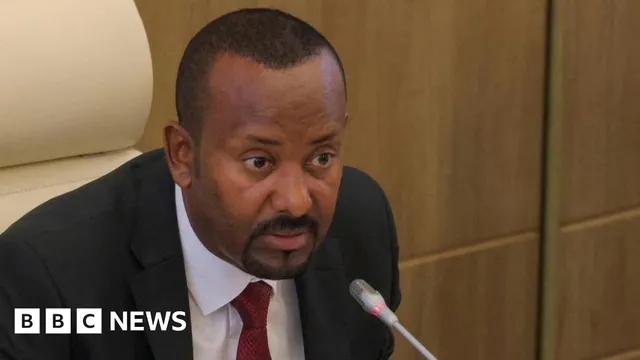
Abiy Ahmed affirms Ethiopia seeks diplomatic resolution with Eritrea
2025-03-20 12:27- Ethiopia is experiencing internal power struggles that may relate to Eritrea's influence.
- Prime Minister Abiy Ahmed emphasizes that Ethiopia seeks a diplomatic approach to resolve sea access issues.
- The potential for renewed conflict remains high due to underlying tensions and accusations of collusion.
Express your sentiment!
Insights
Ethiopia, a landlocked country in the Horn of Africa, is currently experiencing rising tensions with its neighbor Eritrea due to a power struggle within the Tigray People’s Liberation Front (TPLF). Amidst recent political instability, Getachew Reda, Tigray's interim president, has accused rival factions of colluding with Eritrean officials to intensify violence in the region, exacerbating fears of renewed conflict. Previous relations between Ethiopia and Eritrea have been fraught, particularly following the border wars and the civil war in Tigray that ended in late 2022. Prime Minister Abiy Ahmed has publicly stated that Ethiopia wishes to avoid war, emphasizing the need for negotiation over military action. Despite this, Getachew's allegations and fears regarding Eritrea's involvement signal a precarious situation that might lead to broader regional conflict, especially if neighboring Sudanis drawn in due to historical alliances formed during the prior civil war. The overall humanitarian situation remains dire as millions in Tigray depend on international aid, further complicating Ethiopia's internal challenges. Abiy's comments come as a response to escalating concerns about the potential resurgence of violence due to fragile peace agreements and the historical animosities lingering between the two nations.
Contexts
The relationship between Ethiopia and Eritrea has been shaped by a complex history marked by conflict and reconciliation. The two nations share cultural, linguistic, and historical ties, but their relationship has frequently been strained due to border disputes and differing political agendas. Following Eritrea's long struggle for independence from Ethiopia, which culminated in the Eritrean-Ethiopian War from 1998 to 2000, a tense standoff ensued. The war was primarily driven by territorial disputes, especially over the border town of Badme. After a devastating conflict that resulted in tens of thousands of fatalities, a peace agreement was signed in 2000, known as the Algiers Agreement, but relations remained frosty for nearly two decades as both sides engaged in mutual accusations and a militarized border remained intact. In 2018, a significant shift occurred when Prime Minister Abiy Ahmed of Ethiopia and President Isaias Afwerki of Eritrea declared an end to the state of war between their nations. This breakthrough was marked by a historic visit by Abiy to Eritrea, which had not happened in nearly two decades. Subsequent to this, both leaders signed a joint declaration in July 2018, aimed at restoring diplomatic ties. The reopening of embassies, flight connections, and the resumption of trade demonstrated the new approach towards building a harmonious relationship. The reconciliation was widely welcomed within both countries and was viewed as a pivotal moment for peace and stability in the Horn of Africa. However, the path towards sustained peace has been complicated by internal challenges within both nations. Ethiopia is facing multifaceted internal conflicts, including ethnic tensions and political unrest, which have raised concerns regarding its stability and capacity to maintain positive relations with Eritrea. Similarly, Eritrea's political landscape is characterized by a lack of democratic freedom, leading to internal dissatisfaction and calls for reform. These factors have the potential to influence the bilateral relationship as both leaders navigate their domestic issues while attempting to reinforce their partnership. Furthermore, discussions regarding regional cooperation, particularly with neighboring countries like Somalia and Djibouti, highlight the importance of collaboration for shared security and prosperity. Despite these challenges, the potential for a strengthened Ethiopia-Eritrea relationship remains viable. The historic peace accord has opened avenues for dialogue and cooperation, not just between the two countries but also in the broader regional context. International organizations and neighboring states are likely to play a role in fostering development initiatives that can benefit both nations. As domestic tensions are managed, Ethiopia and Eritrea have the opportunity to build on their improved relations, promoting economic integration and stability in the region. The trajectory of their relationship will depend on mutual respect, continuous dialogue, and joint efforts towards overcoming the historical grievances that have characterized their past.